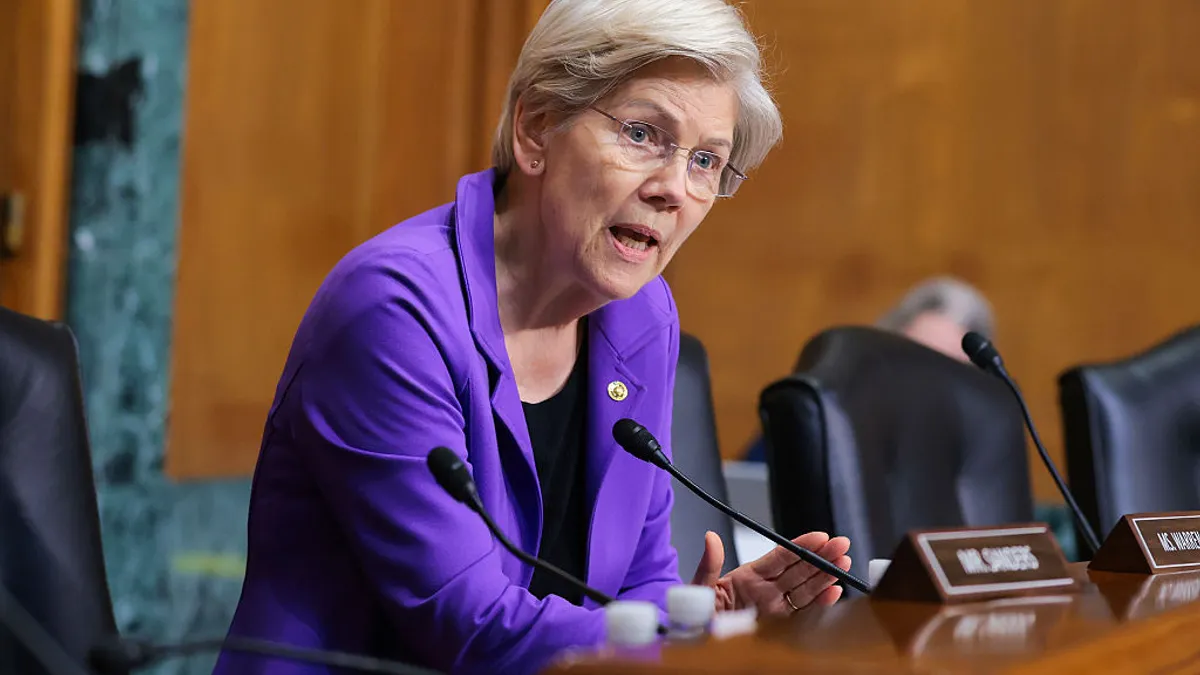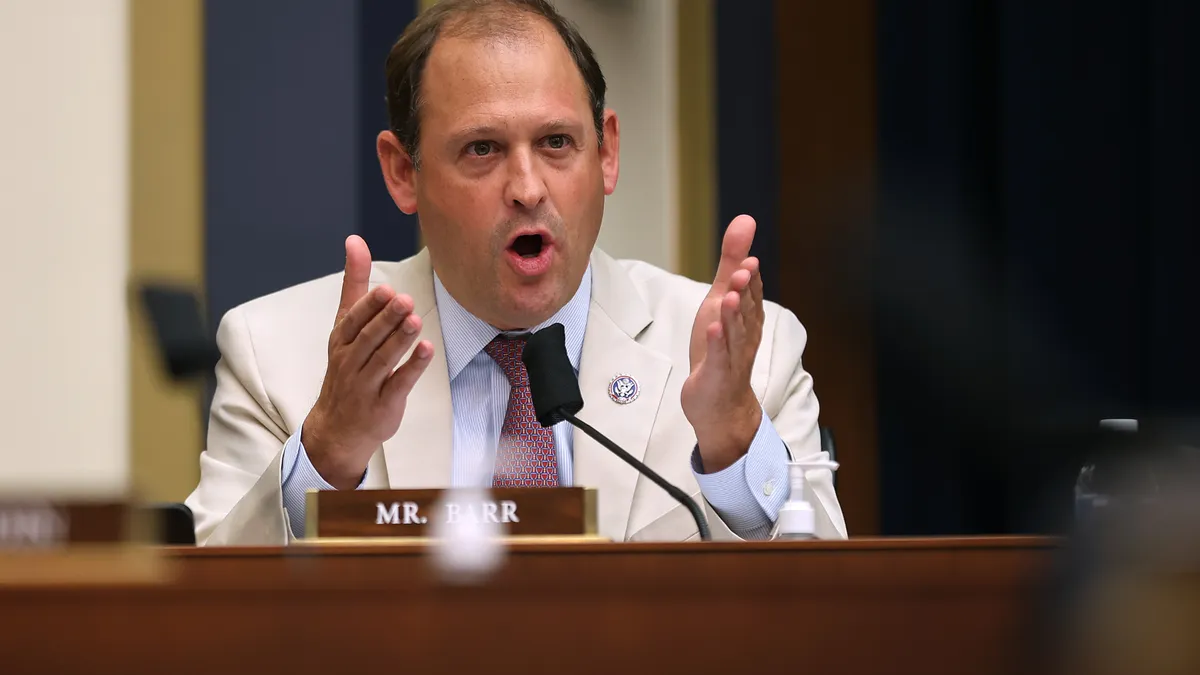UPDATE: March 18, 2021: HSBC has entered final negotiations to sell its French retail banking arm to private-equity firm Cerberus Capital Management, sources told Reuters on Wednesday.
New York-based Cerberus plans to combine HSBC France with My Money Group, a French lender it bought from GE in 2017, The Wall Street Journal reported, citing a message, HSBC’s chief of continental European operations, Jean Beunardeau, sent to French employees. Cerberus also owns sizable stakes in Deutsche Bank and its German rival Commerzbank.
"Discussions are still ongoing and are expected to be for some weeks to come, and these may or may not lead to a transaction," Beunardeau wrote, according to the Journal.
The deal would also include HSBC’s wealth-management operations in France but not its insurance and asset-management operations, according to the message.
Cerberus was competing for HSBC France with London-based AnaCap Financial Partners, sources told the Journal. AnaCap had planned to combine the HSBC’s French retail operations with a similar segment of Barclays that it acquired in 2017, the publication reported.
-----
HSBC said Tuesday it was "exploring organic and inorganic options" for its U.S. retail banking operations — for the first time confirming, amid months of speculation, it is open to selling its 150-branch U.S. footprint. However, the bank said it would maintain a stateside presence for investment banking, corporate and wealth management.
"We don't believe we have a strong competitive position in the [U.S.] retail business [and] COVID and low interest rates have made the challenge even greater," the British bank's CEO, Noel Quinn, told the Financial Times.
The announcement came as HSBC laid out a strategic pivot toward Asia, where the bank looks to spend an additional $6 billion over the next five years to expand in Hong Kong, China and Singapore. That includes $3.5 billion to grow its wealth business, which is expected to hire more than 5,000 new wealth planners over the next three to five years, according to Bloomberg.
The bank also announced it is relocating a trio of executives — Greg Guyett, co-head of global banking and markets, Nuno Matos, chief executive of wealth and personal banking, and Barry O'Byrne, chief executive of commercial banking — to Hong Kong from London.
"It's logical to have more of the management team down there," HSBC's CFO, Ewen Stevenson, told Bloomberg. "Fifty percent of our revenues, and the bulk of our profits, now come from Asia and certainly the thrust of our growth aspirations are in Asia."
Despite the management shift, Quinn ruled out another review to potentially move the bank's headquarters.
"We plan to focus on and invest in the areas in which we are strongest," Quinn said, according to The Wall Street Journal.
HSBC also said it aims to shrink its property footprint by 40% over time, an effort that won't affect the bank's Canary Wharf headquarters or its outpost in Hong Kong. But leases on peripheral properties in London may not be renewed, Quinn said.
"We have got to face reality, the world has changed," Quinn told the Financial Times. "Our travel and premises costs will be a lot less than they were pre-COVID."
Tuesday's strategy update comes about a year after the bank announced it planned to cut 35,000 jobs and $100 billion in assets over three years. To that end, HSBC's headcount stands around 226,000, according to an annual report the bank released Tuesday. That's down about 11,000 from last year, Reuters reported.
HSBC said it will cut heavily from its back-office functions such as technology and operations, but the bank did not put forth a concrete number, according to the wire service. It did, however, say it aimed to slash an extra $1 billion in annual costs.
In its annual report, the bank said its profit before tax dropped 34% from 2019 — to $8.78 billion. HSBC set aside $8.82 billion in loan-loss provisions in 2020, compared with less than $3 billion a year earlier.
The bank also said it would resume paying a dividend of $0.15 a share after British regulators relaxed a ban on such payouts. However, it said it doesn't expect to reach its previously stated 2022 goal of a 10% to 12% return on average tangible equity. Rather, HSBC will now target a return of 10% or above in the medium term.
"It's hard to have high ambitions in this climate, or at least dangerous to declare them if they exist," Hugh Young, managing director at Aberdeen Standard, an HSBC shareholder, told Reuters.
Stevenson told the wire service the biggest structural shift since HSBC laid out its three-year plan in February 2020 is that interest rates have sunk.
But that hasn't kept some markets from being profitable. Profit from the bank's wealth management and personal banking division in Asia was $5 billion in 2020, and Hong Kong accounted for nearly all of that, even though the bank took the controversial stance to help police with investigations into pro-democracy activists.
By comparison, HSBC's U.S. retail business took a pretax loss of $547 million last year. The bank closed 79 of its U.S. branches in the first half of 2020.
France is another market from which HSBC is looking to extricate itself — and has since at least early last year, despite reports to the contrary. On that front, the bank said it was "in the final stages at the negotiations of a potential sale" of its 200-branch footprint in that country, although it would most likely come at a loss.
Private-equity firm Cerberus and a rival told HSBC they would buy the French retail arm for a symbolic one euro if the bank were to invest €500 million into the business, Reuters reported in September.
Of the bank's Asia pivot, Dan Lane, a senior analyst at British digital broker Freetrade, told Reuters, "Everyone realizes how big an economic opportunity China and India are, but HSBC is starting to realize no one has the opportunity to serve that wealth creation like they do."




















